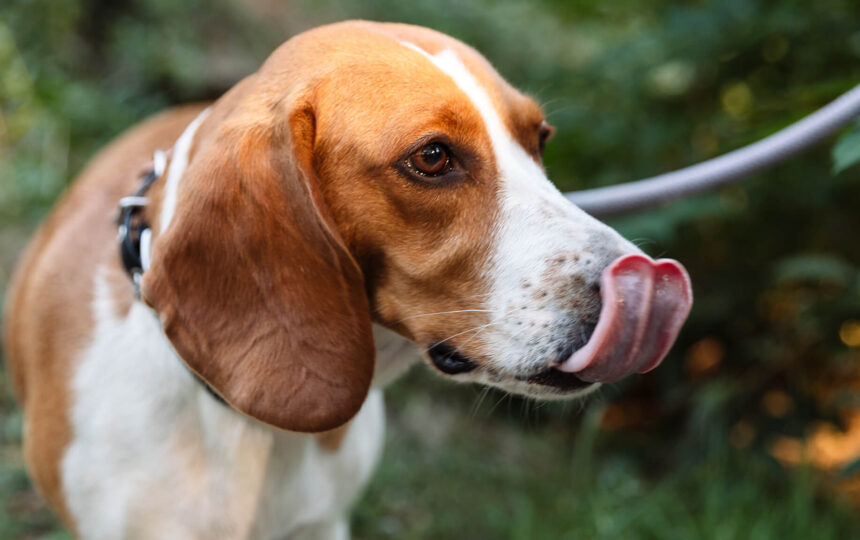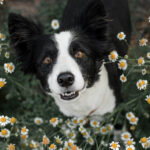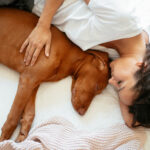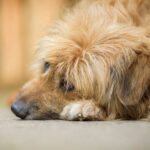Is your pooch a licking machine? Licking is a normal canine behavior, but there comes a tipping point when normal behavior seems to become an obsession. Some dogs lick humans as a sign of affection – others lick themselves or strange surfaces. But what does all this licking really mean, what are our dogs trying to tell us?
Because dogs can’t speak, we won’t know the true cause of their licking unless we do some investigating ourselves. It’s essential to pinpoint what might be causing the excessive licking to provide care or prevent issues from arising.
In this article, we will uncover 11 reasons why your furry friend may be obsessed with licking and what can be done about it.
Boredom or anxiety
Stress and boredom impact dogs in a number of ways. They might be destructive – acting out – they may whine, drool, yawn or lick.
Just like you might engage in a repetitive motion like shaking your leg or twirling your hair when you are bored or anxious, dogs lick. It is a way to express what they are experiencing on the inside.
According to Certified Professional Dog Trainer Nicole Ellis,
“When a dog is stressed, often they will pick up a behavior just like we often do,” says Ellis, kind of like a nervous habit. So often, our dogs will start licking, and that’s kind of a calming repetitive behavior.”
If your pup is bored or anxious, you may find them engaging in self-grooming beahaviors such as licking their coat. Separation anxiety often triggers licking.
Licking is quite soothing and distracting for dogs. In fact, it releases calming hormones, like dopamine and endorphins, that promote relaxation and good feelings.
You might have to do a little sleuth work to determine if your pup is suffering from seperation induced licking. Install a camera to watch your pooch while you are gone to see if the licking behavior is happening while you are away. If so, make the appropriate adjustments to help your fury friend cope and be less anxious.
Obsessive-compulsive disorder
Dogs, like humans, can develop obsessive-compulsive disorder (OCD), which manifests in excessive licking. Your dog may appear driven to lick, and even if you try to help them stop by physically intervening, they return to the behavior.
Canines suffering from OCD often lick other things besides themselves, like the floor, furniture, or toys. Other signs that your pup may have OCD include, pacing, chasing the tail, shapping at flies, excessive water drinking, spinning, and eating dirt.
Dr. Jerry Klein, AKC chief veterinary officer, notes that while any dog could develop OCD, certain breeds are more susceptible to compublsive behaviora. According to Merck, German Shepherds and Bll Terriers often spin or chase their tail and Doberman Pinshers may suck on their leg. Research has found structural brain abnormalities in Doberman Pinschers with OCD that are very similar to those found in humans with OCD.
Digestive distress
Excessively licking surfaces ( ELS) and excessive swallowing are signs of a potential gastrointestinal issue, such as reflux, nausea, or an upset stomach According to a study in the Journal of Veterinary Behavior, up to 60% of dogs who lick excessively suffer from gastrointestinal distress.
“Nineteen dogs presented with ELS were included in the licking group, and 10 healthy dogs were assigned to a control group. Behavioral, physical, and neurological examinations were performed before a complete evaluation of the GI system. Treatment was recommended on the basis of diagnostic findings. Following the initialization of treatment, dogs were then monitored for 90 days, during which their licking behavior was recorded. GI abnormalities were identified in 14 of 19 dogs in the licking group.”
Pain
Dogs with arthritis or an injury may lick to relieve pain, just as humans would rub a sore muscle or an achy joint. The main reason for licking when in pain is because natural painkillers, called endorphins, that fight pain are released with licking. If you suspect your pup is licking due to pain, look for other symptoms such as whining, hiding, or issues climbing stairs, jumping or walking.
Allergies
If you have allergies, you know how your eyes, nose, and throat itch. If you have allergies, licking skin or paws may be a sign of allergies -either airborne, including molds or pollen, or food allergies.
Dogs with food allergies may excessively lick their paws. Environmental allergies also cause paw licking and other symptoms such as ear scratching and hot spots.
Skin conditions
Dogs may lick a particular part of their body if they are suffering from a skin condition either brought on by an immune response related to a disease, such as an endocrine disorder. Many dogs develop hot spots, which are basically regions of dermatitis or infected skin that are uncomfortable – leading to licking to ease pain and itching.
Infection
Flea bites can damage skin and leave your pup susceptible to infections that cause itchiness. Ticks also pose a threat and can cause Lyme disease, which is highly uncomfortable and may cause licking. Untreated bacteria, fungi, or parasites lead to infections that cause itchiness and excessive licking or ch ewing. This is generally around the tail, neck, backside or groin area.
What happens when dogs lick other dog’s pee?
We have covered some of the main reasons dogs lick themselves or surfaces – but what if you have a dog licking where other dogs have used the bathroom? What does it mean, and can it hurt them?
As you walk your dog you may notice the occasional sniff, rub or even lick on bushes or other surfaces. Your dog instinctively gathers information about other dogs that have passed by and even peed on the spot.
While smelling is good and mostly harmless – licking is not so. Your pup can contract a bacterial disease known as leptospirosis. If a dog has leptospirosis, it can spread it through its urine, affecting anyone who comes in contact with the urine.
To keep your dog from contracting an infectious disease, train them not to lick. Use cues like leave it or drop it and provide positive reinforcement when listening. If you take your dog to a dog park, watch for licking and take action to protect your furry friend.
What if my dog licks me too much?
Doggie kisses are nice, but what if they are over the top? Some dogs just can’t get enough of these smooches. Here are some reasons why your pup seems to be showing over-the-top affection.
- To get attention – Some pups lick to get your attention.
- Because you taste good –Does your dog love to lick you after a hard workout? This is because dogs love salty skin.
- To calm their anxiety – Your dog finds comfort in your scent. Just as an anxious dog may lick themselves, they may also lick their pet parents excessively to calm their stress.
- To welcome you home – Your dog kissing you after you have been apart is a natural way to welcome you home.
How to stop my dog from excessive licking
If you notice strange licking behavior in your pet, don’t ignore it, as it could be a sign that your furry friend is in distress. It’s best to visit your vet for some diagnostic tests to find the underlying reason for the excessive licking. A thorough health checkup will help you rule out anything medical, provide a diagnosis and necessary treatment.
With that said, if you have a healthy super, licking pup, here are a few things you can try to reduce the behavior.
- Spend quality time with your pup – Spend quality time with your furry friend daily in grooming, petting, playing, etc.
- Reward good behavior – When your dog is behaving – not licking you excessively – provide a reward immediately after acknowledging the good behavior. This will help train your pooch to lick less.
- Shower after your workout – Showering immediately after a workout will help deter your pup from showering you with licks.
- Provide regular opportunities for exercise – To help your pup combat attention seeking and boredom or anxious licking, be sure to adopt a regular exercise routine. Even a daily walk around the block can do wonders to relieve anxiety and boredom and provide quality time for you and your furry friend.
Remember, dogs instinctively lick. Some licking is normal, but if your dog is licking excessively, do some digging and monitoring to get ot the bottom of the root cause.






